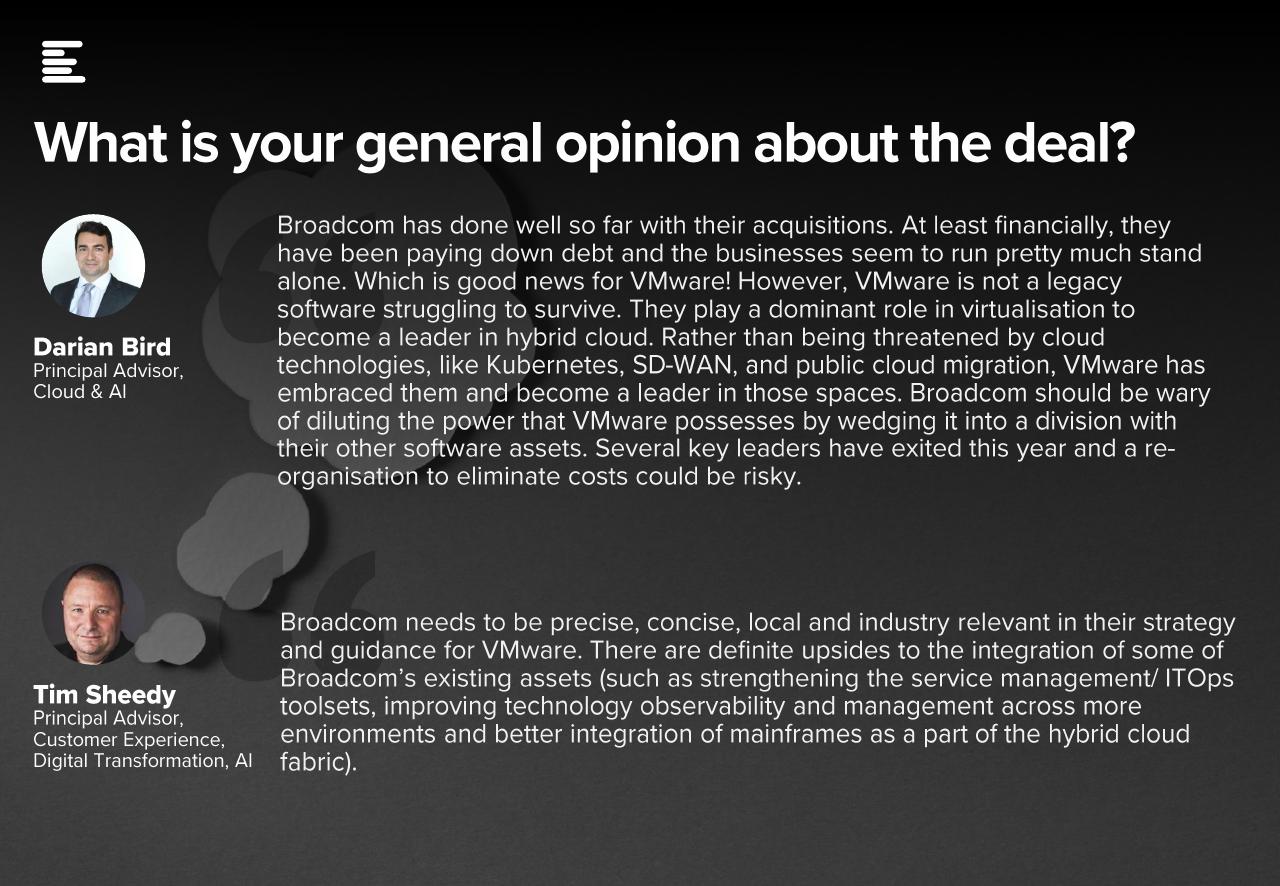Broadcom's VMware Acquisition: AT&T Highlights Extreme Price Increase Concerns

Table of Contents
AT&T's Concerns Regarding VMware Price Increases
AT&T's reliance on VMware's virtualization technologies is extensive, making them particularly vulnerable to potential price hikes following the Broadcom acquisition. The implications are far-reaching, affecting not only their operational budget but also their competitive standing in the telecommunications market.
Increased Costs for Networking and Cloud Infrastructure
- Heavy Reliance: AT&T utilizes VMware's vSphere, NSX, and other products extensively for its network infrastructure, virtualizing servers, storage, and networking components. This allows for efficient resource allocation and management within their massive data centers.
- Licensing and Support: The cost of licensing, support, and maintenance contracts for these VMware products represent a significant portion of AT&T's IT budget. Any substantial price increase would directly impact their operational expenses.
- Budgetary Impact: A price hike could force AT&T to allocate more resources to maintaining its existing VMware infrastructure, potentially diverting funds from other crucial projects, such as network upgrades or new service development.
- Alternative Solutions: Facing potentially crippling cost increases, AT&T might be forced to explore and implement alternative virtualization solutions, a costly and time-consuming undertaking. This would involve extensive testing, migration, and retraining of staff.
Impact on AT&T's Competitive Landscape
The potential price increases resulting from the Broadcom-VMware merger pose a serious threat to AT&T’s competitive position.
- Reduced Profitability: Higher costs for VMware products could squeeze AT&T's profit margins, impacting their ability to invest in innovation and compete effectively.
- Cost Pass-Through: AT&T might be forced to pass on increased costs to its customers, potentially leading to higher prices for its services and a loss of market share to competitors.
- Mitigation Strategies: To counter these challenges, AT&T may need to renegotiate existing contracts, explore alternative virtualization platforms, or invest in automation and optimization strategies to reduce their reliance on VMware's expensive solutions.
Broader Implications of the Broadcom-VMware Merger
The Broadcom-VMware merger has wider implications than just affecting individual companies like AT&T. The deal's impact on competition and the broader business landscape warrants careful consideration.
Antitrust Concerns and Regulatory Scrutiny
The merger is currently under regulatory scrutiny globally, with antitrust concerns being raised by several competition authorities.
- Reduced Competition: Critics argue that the merger could reduce competition in the virtualization market, potentially leading to higher prices and less innovation for all businesses relying on these technologies.
- Regulatory Decisions: The outcome of the regulatory review process will play a critical role in determining whether the merger proceeds as planned and, crucially, whether price increases will be significantly mitigated.
- Market Dominance: Broadcom's acquisition of VMware has created concerns about the combined entity's dominance in the market, potentially stifling innovation and choice for customers.
Impact on Businesses Relying on VMware Products
The potential for price increases extends beyond AT&T, affecting countless businesses that rely on VMware products for their operations.
- Widespread Price Hikes: Many anticipate across-the-board price increases for VMware's extensive range of products, from vSphere to vSAN and NSX.
- Disproportionate Impact: Smaller businesses, with limited resources and less bargaining power, may be disproportionately affected by these price increases.
- Business Responses: Businesses will likely respond in various ways, including negotiating with Broadcom, exploring alternative virtualization technologies (like Red Hat Virtualization or Microsoft Hyper-V), or optimizing their existing VMware deployments to reduce their reliance on expensive features.
Potential Alternatives and Mitigation Strategies
Businesses facing the potential for substantial price increases after the Broadcom-VMware merger have options to consider.
Exploring Alternative Virtualization Platforms
Many viable alternatives to VMware exist, each with its strengths and weaknesses.
- Open-Source Options: Open-source virtualization platforms like Proxmox VE offer cost-effective alternatives, though they may require more technical expertise to manage.
- Competitor Solutions: Other virtualization platforms like Microsoft Hyper-V, Red Hat Virtualization, and Citrix XenServer offer robust features and support, but transitioning away from VMware can be complex.
- Cloud-Based Alternatives: Cloud providers such as AWS, Azure, and Google Cloud offer virtualization services, providing scalability and flexibility but potentially with different pricing models.
Negotiation and Contractual Strategies
Proactive negotiation and strategic contract management can help businesses mitigate the impact of potential VMware price increases.
- Long-Term Contracts: Securing long-term contracts with favorable pricing terms can help businesses lock in current rates or negotiate for gradual price increases.
- Volume Discounts: Businesses with high VMware usage volumes may be able to negotiate volume discounts to offset some of the cost increases.
- Service Level Agreements (SLAs): Robust SLAs can ensure that Broadcom meets its service commitments and provides adequate support.
Conclusion
The Broadcom-VMware merger presents significant challenges, particularly for major users like AT&T, who face the prospect of substantial price increases for crucial virtualization technologies. The potential impact extends far beyond AT&T, affecting the broader business landscape and raising significant antitrust concerns. Businesses must carefully assess the implications and develop strategies to mitigate potential cost increases, including exploring alternative virtualization solutions, negotiating favorable contracts, and optimizing their existing infrastructure. Understanding the implications of the Broadcom VMware acquisition is critical for navigating the evolving enterprise software market.
Call to Action: Stay informed about the ongoing developments in the Broadcom-VMware acquisition and proactively plan for potential price increases to protect your business from the impact of this mega-merger. Proactive planning around the Broadcom VMware acquisition is essential for long-term cost management and business stability.

Featured Posts
-
 Pfas Contamination In Blue Mountains Reservoir Cancer Risk Concerns
May 16, 2025
Pfas Contamination In Blue Mountains Reservoir Cancer Risk Concerns
May 16, 2025 -
 Ali Marks Unveiling The Life Of Jalen Brunsons Partner
May 16, 2025
Ali Marks Unveiling The Life Of Jalen Brunsons Partner
May 16, 2025 -
 Dominate Your Mlb Dfs Contest May 8th Sleeper Picks And Hitter To Avoid
May 16, 2025
Dominate Your Mlb Dfs Contest May 8th Sleeper Picks And Hitter To Avoid
May 16, 2025 -
 Tam Krwz Ke Jwte Pr Mdah Ka Pawn Hyran Kn Waqeh
May 16, 2025
Tam Krwz Ke Jwte Pr Mdah Ka Pawn Hyran Kn Waqeh
May 16, 2025 -
 Who Blinked First Resolving The Us China Trade Standoff
May 16, 2025
Who Blinked First Resolving The Us China Trade Standoff
May 16, 2025
